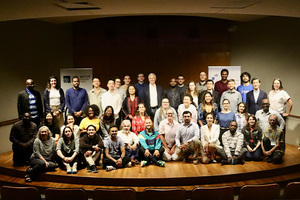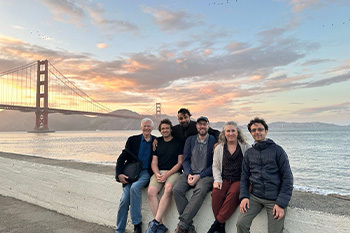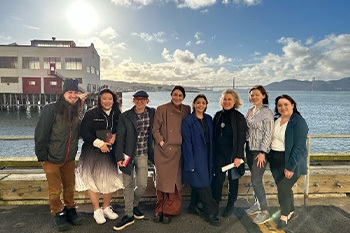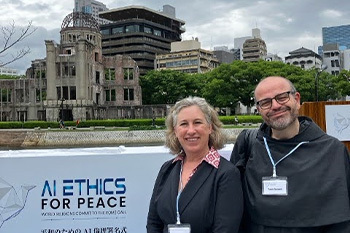
Campus came to life this summer with a four-day workshop on deliberative technologies used for peace, marking the Kroc Institute for International Peace Studies’ return to summer programming for the first time since the pandemic.
Co-sponsored with the Tokyo-based Toda Peace Institute and facilitated by Kroc Institute faculty member Lisa Schirch, Richard G. Starmann, Sr. professor of the practice of peace studies and senior research fellow with the Toda Peace Institute, the workshop ran from June 24 – 27 with the theme, “Deliberative Technologies, Computational Democracy, and Peacebuilding in Highly Polarized Contexts.” Close to 50 peacebuilding practitioners, democracy experts, and computer scientists from around the world gathered to discuss the ways in which deliberative technologies could be harnessed to promote democracy and social cohesion, and reduce polarization. The workshop grew out of Schirch’s long-standing collaboration with the Toda Peace Institute, investigating and developing the constructive role technologies can play in peacebuilding.
“Not only were we able to bring together practitioners from Afghanistan, Palestine, Myanmar, Colombia, Nigeria, Kenya, the DRC, South Africa, and the US, but we also had about a dozen computer scientists from various companies focused on developing tech to foster democratic deliberation,” said Schirch. “The depth and breadth of experience, voices, and innovative ideas shared in conversation were inspiring, and really speak to the potential for impact which these forums generate.”
The workshop included breakout sessions to learn how to use several different platforms, and the opportunity for regional groups to discuss how they might use the technologies to support wider peace and democratic processes. “Increasingly, tech is used to fuel polarization and so what we are interested in exploring in this workshop— and in my wider research project with the Toda Peace Institute— is how we can actively counteract this trend by using tech to amplify peace and social cohesion,” said Schirch.

The project began in 2016, exploring how new technologies were affecting peace and democracy. A series of workshops followed, which generated a further global research project, an edited book, and the formation of a Council on Technology and Social Cohesion. Schirch serves as one of three co-chairs of the Council, which includes a dozen leading organizations expressing concern about how tech platforms are affecting society. She took nine Kroc Institute students to the launch of the Council in San Francisco in February 2023 at a sold-out conference of 250 people. Several students landed internships and jobs based on contacts they made with tech companies at the conference. Two students accompanied her to the Council’s first meeting in December 2023 in Nairobi, Kenya.
A few months later, in March 2024, the Keough School of Global Affairs sponsored a symposium on deliberative technologies in Washington, D.C. with Nobel Peace Laureate Maria Ressa, which Kroc Institute students also attended– further testimony to the importance of strategically developing the place and function of deliberative technologies in peacebuilding.

Schirch’s work has been recognized by leading tech companies including OpenAI and Google’s Jigsaw as well as the Vatican. With a team of tech experts involved in research on Democratic Inputs into AI, Schirch explored the use of deliberative technologies to gather public input into the ethics and rules guiding OpenAI’s ChatGPT.
In July 2024, Father Paolo Benanti heading the Vatican’s Rome Call on AI Ethics invited Schirch to present her research at a global conference of religious leaders discussing AI ethics in Hiroshima, Japan. The site was chosen to highlight how technologies like AI and the atomic bomb can bring devastating consequences to society.

Schirch’s workshop not only proposed current plans to use technologies but also suggested ways to continue an ongoing learning community to share lessons, risks, and ideas about how to safely use these new technologies to support peacebuilding in polarized contexts.